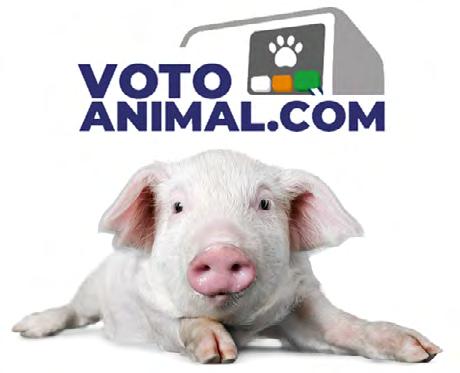
4 minute read
Abolitionist notes
ABOLITIONARY NOTES
Green blood
Advertisement
In the first quarter of the year, a group met at Hemocentro Foundation of Brasília, the blood center of the city, to carry out the first collective blood donation of vegan activism in the city. The action, entitled “Vegans donate blood, 1st edition”, involved 15 people, who helped to save up to 60 lives.
The initiative inaugurates a periodic calendar of donations, stimulates the debate on oppression and on the need to respect all animals (human and non-human) and gives visibility to veganism and Animal Rights. Professor Vanessa Negrini was one of the organizers of the collective action. The group’s intention was to show that veganism is not only fundamental in respecting and caring for animals, but also in citizenship activities. After all, veganism goes far beyond food. It is not simply to stop eating meat and animal products, but also to bring this same awareness to all sectors of human activity that exploit animals, not just the food industry. It is a philosophy of life that involves the awareness of doing good to human and non-human animals and the environment. In other words, the entire planet. The group’s next blood donations are scheduled for 06/03/2022 (close to World Environment Day) and 11/1/2022 (World Vegan Day).
Personal archive
Vanessa Negrini: organizer of the action. The inscription on her t-shirt reads: “Vegan people donate blood and save lives”
Solidarity Buns
Since 2021, FALA has maintained a partnership with the social factory of Maria Teixeira School (EMT, in the acronym in Portuguese), an assistance and teaching entity for children and young people with special needs, located in Jardim Ingá (in Luziânia/GO) (link to article about the entity: https://bit. ly/2W07pUI). As part of the partnership and with the help of volunteers, several kilos of “kiss breads” manufactured by EMT (vegan cheese breads, based on sweet potatoes and grains) are sold in several regions of the DF*. Part of the income from the sale of the kiss bread is donated to FALA’s social initiatives. One of these initiatives was carried out in support of a vegan solidarity action for 70 registered families from the Santa Luzia neighborhood, an extremely needy community in the Structural City (DF), conducted by the Atlântida Institute, a partner entity of FALA. In the action, in addition to a spectacular vegan meal, toys, clothes and vegan food baskets were donated to families. The next action is scheduled for May this year, which will receive special press coverage from the Animal Release team.

FALA Paulo Castro/
EMT: partnership with FALA in support of social actions
Awareness in the partnereducative system
In 2022, FALA also completes 10 years of holding lectures on Animal Rights for young people in socio-educational measures. The last rounds of lectures took place in Brasília (DF), at the end of last year, at the São Sebastião Internment Unit (UISS). Although the lectures were intended exclusively for young people, adults (teachers and prison guards at the unit) also participated, even with the adherence of some to veganism. One of the speakers gave us a touching statement about these meetings.
The lectures that FALA volunteers give in the socio-educational system are only possible thanks to the support of people as Professor Liliane Barki, as well as the other teachers and employees of the units, who are an important part of all the work carried out by FALA to raise awareness of young people on the subject.

Guilherme Leonardi: lecture on Animal Rights in the socio-educational system
Personal archive
Interview with Bernardo Feitosa
Can the young people in the lectures make any correlation between the violence they suffer and the violence also suffered by animals?
Sometimes. It depends on the size of the class, maturity, experiences and engagement. People often emphasize the link between animal abuse and human abuse, saying how speciesism, racism, homophobia, machismo and misogyny are connected. Making this link is easier for some, while not for others. In one way or another, the connection made by them tends to be more in the sense of “taking care of the animals”.
Are some young people surprised when this correlation is made?
Yes. Many of them feel offended, but eventually get the message.
Do you have any feedback from young people regarding this type of connection made during the talks?
Yes. We see interest when they apply the teaching. Most tend to connect and are especially impressed by animal testing. In some cases, they have already said that they would become vegetarians or vegans if there was that option for them.

Personal archive
Bernardo Feitosa: “it is necessary to do something to reduce all the animal’s suffering.”
Do young people understand that violence against an animal is no different from violence against a person or against nature in general?
Generally, yes. The most difficult thing is to understand the consequence of the act. Many see violence against animals as more “acceptable” than violence against humans. They see acts of violence against non-human animals as something more barbaric, but with less criminal repercussions. Still, most are interested in intervening if they witness something like this.
In the lectures, which event impressed you the most?
When part of a class treated me as a moral reference and asked for directions or advice.
What is the main lesson that young people learn from the lectures?
That animals suffer a lot and that something needs to be done to reduce all this suffering.
Pagamentos facilitados!

CONSTRUINDO com você!

FONES: (61) 3382-8020/ 3382-0744




